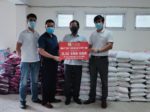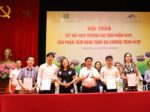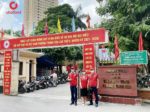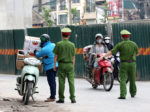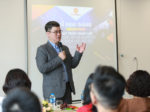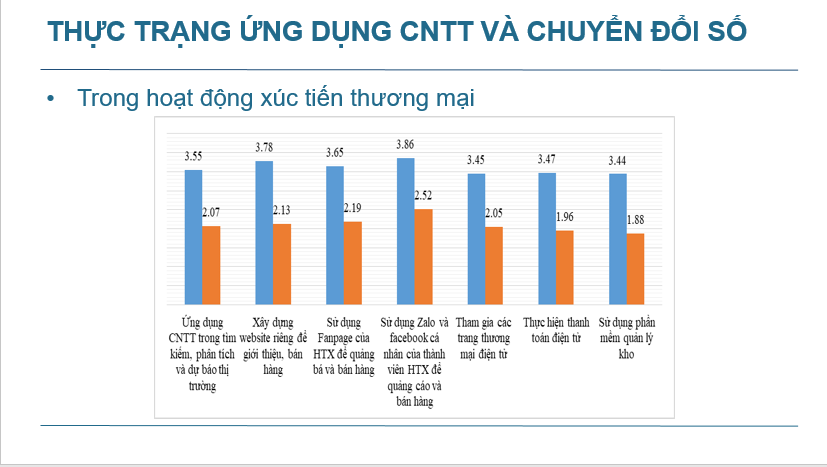According to the survey results to assess the current status of information technology application and digital transformation of 153 agricultural cooperatives in 3 provinces of Hoa Binh, Quang Tri and Soc Trang, the application of information technology and digital transformation in management, administration, as well as trade promotion have not met expectations…
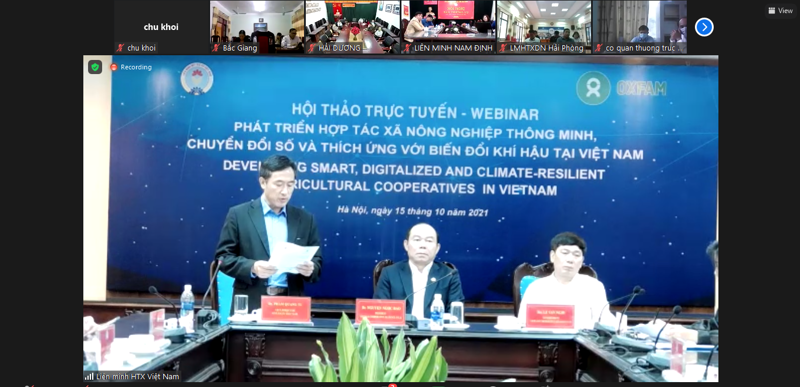
The conference took place online.
Digital transformation is of great significance, promoting the production of quality goods and opening up opportunities for rapid and sustainable development of cooperatives, said Dr. Pham Quang Tu, Deputy Director of Oxfam Vietnam at the seminar “Developing smart cooperative models, digital transformation to adapt to climate change” organized by the Vietnam Cooperative Alliance in collaboration with Oxfam held on October 15, 2021 in the form of online.
INFORMATION TECHNOLOGY APPLICATION HAS NOT BEEN AS EXPECTED
“With the vision of building a humane, people-centred economy and leaving no one behind, Oxfam has been working with stakeholders to leverage the power of information technology in activities to support people and disadvantaged communities to participate effectively in the digital economy and digital society,” affirmed Mr. Pham Quang Tu.
Tran Tuan Viet, Deputy Director of the Information and Communication Center of the Vietnam Cooperative Alliance, said that recently, the Vietnam Union of Cooperatives has surveyed and assessed the current situation of information technology application and transfer of information technology. Change the number of agricultural cooperatives in 3 provinces of Hoa Binh, Quang Tri and Soc Trang representing the 3 North, Central and South regions.
Through a survey of the situation at 153 cooperatives, the implementation of information technology and digital transformation in management, administration, and trade promotion has not met expectations.
The rate of high technology applied in the cooperatives today: 82.4% of the cooperatives have applied cultivation, rearing and preservation techniques; 8.5% of cooperatives have applied irrigation automation technology; 8.5% of cooperatives apply biotechnology.
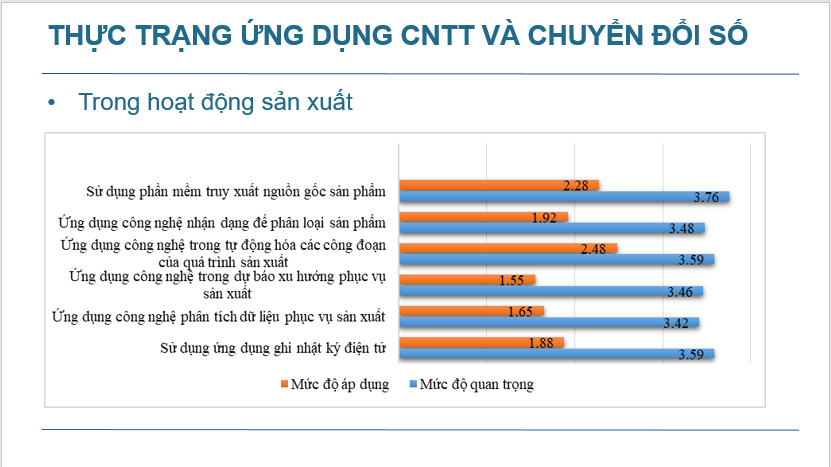
However, the rate of agricultural cooperatives digital transformation and application of information technology is still low. Trade promotion activities through information technology applications are not diversified, mainly using simple and low cost social networking sites.
“Although cooperative managers appreciate the importance of applying information technology and digital transformation, the actual application level is only in the range of 1.98-2.82/5. For example, “using product traceability software only achieved 2.28/5 points, unsatisfactory was 3.76 points”, Mr. Viet added.
The reason, according to Mr. Viet, lies in the fact that most of the information technology software and applications used by cooperatives are free from the support of the tax authorities, the Department of Science and Technology, the Union of Cooperatives province or other international organizations.
Assoc. Prof. Dr. Pham Quang Ha, Chairman of the Scientific Council of the Vietnam Association of Digital Agricultural Cooperatives gave many suggestions to build smart cooperatives. In which, it is necessary to build a supply chain and consume products through the wholesale and retail system, connect and share new technologies: Biotechnology; ICT technology; Automation technology; CNC, IOT, drone, AI applications.
“Every Smart Agriculture cooperative needs to have: smart management, smart product selection, smart members, smart production organization, being in connection and sharing to cooperate and develop together. It is necessary to associate the development of smart agricultural cooperatives with smart rural areas”, said Mr. Pham Quang Ha.
IMPOSSIBLE TRAIN NUMBER CONVERTER
Dang Van Chinh, Chairman of the Board of Directors and Director of Hue Information Technology Cooperative (HueTechCo.op), said that HueTechCo.op currently has more than 50 products and services that have been deployed to customers and partners in more than 20 Vietnamese provinces and cities.
Up to now, there have been more than 300 cooperatives using the Cooperative Accounting software set up by HueTechCo.op. In which, over 100 cooperatives use Power Management software; More than 30 cooperatives use software: Water management, environmental management, market management, night duty management, ..
Mr. Chinh commented that there are still many cooperatives that are not ready to change their perception of digital transformation. On the other hand, many tools (software) are still not easy to use, bringing convenience to users.
Therefore, the design of software applications in digital transformation must be in the direction of increasing service quality, reducing time and human resources, and not increasing the burden among stakeholders. “Cooperatives need to constantly update their knowledge and actively participate in training courses,” Mr. Chinh recommended.
Referring to the e-commerce business model, Mr. Do Le Binh, Director of Information Technology Department of Ho Chi Minh City Union of Trade Cooperatives (Saigon Co.op), shared, B2B (Business to) model. Business) exhibits many advantages.
With the task of connecting and selling, B2B platform has a main interface with a search engine to help buyers quickly find the seller’s products. This exchange is also an intermediary for the assessment of agricultural product suppliers, an intermediary connecting transportation, providing a variety of payment methods such as: bank cards, debit cards, credit cards, e-wallets…
The B2B platform also helps to create a separate page promoting the cooperative and the product, by providing the seller with a separate interface with full product profile information.
Ms. Nguyen Thi Thanh Thu, member of the Executive Committee of the Vietnam Digital Agriculture Association (VIDA), said that a number of agricultural digitization projects have been implemented with great success.
Specifically, the project on conservation and development of the Vietnamese H’Mong cattle value chain in the Northern mountainous provinces (Ha Giang, Cao Bang, Bac Can, Tuyen Quang); Management project of the Bovine Bank with loans from the Farmers’ Union of Tuyen Quang province; The Central Highlands Wild Boar Cooperative Digitization Project of the Farmers’ Association of Dak Lak Province; The project to digitize the growing area code, the code of the packing facility of litchi of Bac Giang province…
Ms. Thuc suggested some advanced digital transformation application technologies today, such as: unmanned aerial vehicles, automatic breeding technology, remote sensing image software…. Ms. Thu also introduced solutions. Smart agriculture on the basis of Auto Agri technology, outstanding with many features: digitizing data of each member household of the cooperative, making a household’s asset book, making an electronic diary, decentralizing supervision.
“Opportunities for digital transformation with the cooperative block are wide open in the immediate future, so from cooperatives to each agricultural production farmer household should not miss this digital transformation train,” Ms. Thuc Thuc emphasized.
Source: vneconomy.vn





